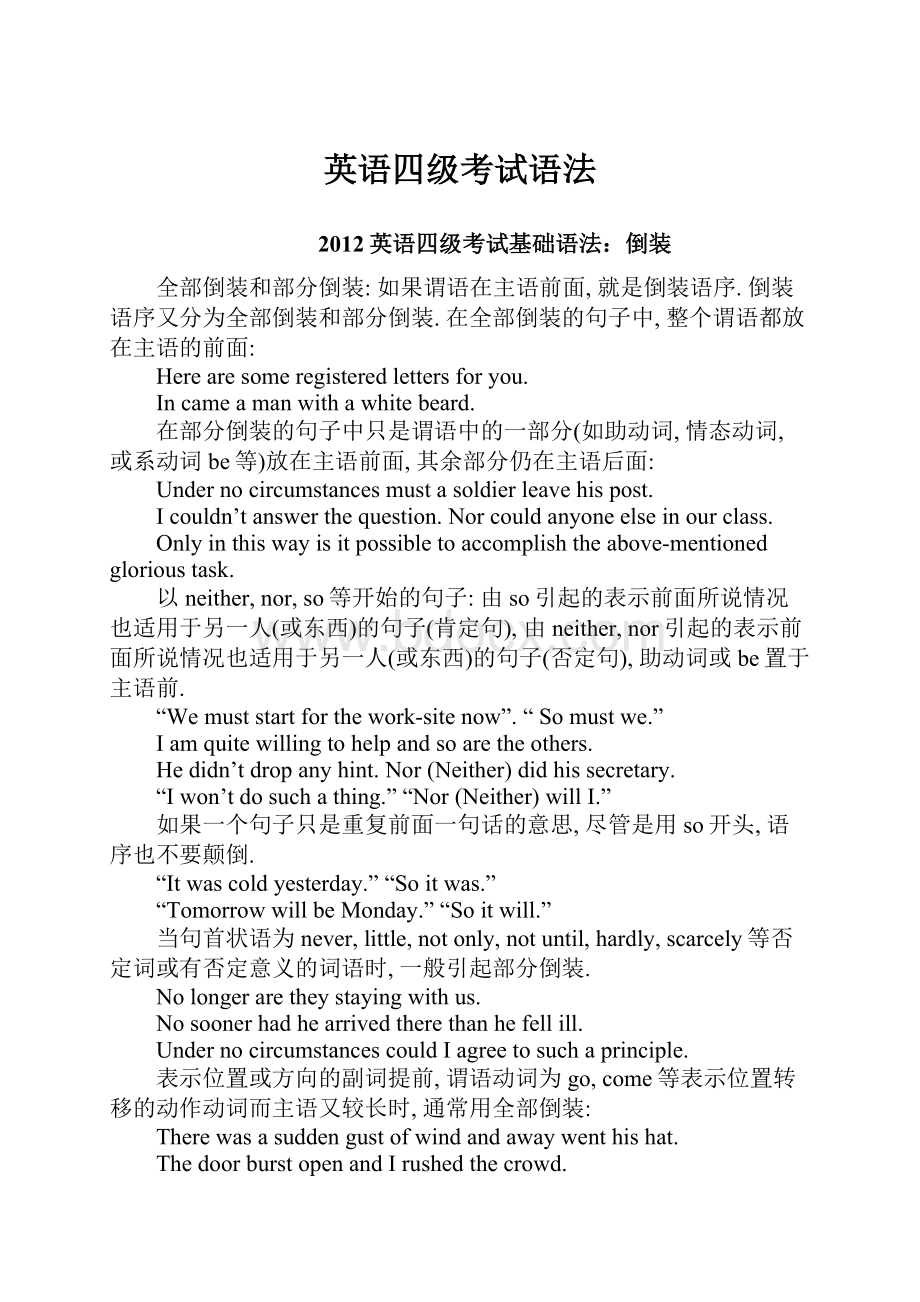英语四级考试语法.docx
《英语四级考试语法.docx》由会员分享,可在线阅读,更多相关《英语四级考试语法.docx(7页珍藏版)》请在冰豆网上搜索。

英语四级考试语法
2012英语四级考试基础语法:
倒装
全部倒装和部分倒装:
如果谓语在主语前面,就是倒装语序.倒装语序又分为全部倒装和部分倒装.在全部倒装的句子中,整个谓语都放在主语的前面:
Herearesomeregisteredlettersforyou.
Incameamanwithawhitebeard.
在部分倒装的句子中只是谓语中的一部分(如助动词,情态动词,或系动词be等)放在主语前面,其余部分仍在主语后面:
Undernocircumstancesmustasoldierleavehispost.
Icouldn’tanswerthequestion.Norcouldanyoneelseinourclass.
Onlyinthiswayisitpossibletoaccomplishtheabove-mentionedglorioustask.
以neither,nor,so等开始的句子:
由so引起的表示前面所说情况也适用于另一人(或东西)的句子(肯定句),由neither,nor引起的表示前面所说情况也适用于另一人(或东西)的句子(否定句),助动词或be置于主语前.
“Wemuststartforthework-sitenow”.“Somustwe.”
Iamquitewillingtohelpandsoaretheothers.
Hedidn’tdropanyhint.Nor(Neither)didhissecretary.
“Iwon’tdosuchathing.”“Nor(Neither)willI.”
如果一个句子只是重复前面一句话的意思,尽管是用so开头,语序也不要颠倒.
“Itwascoldyesterday.”“Soitwas.”
“TomorrowwillbeMonday.”“Soitwill.”
当句首状语为never,little,notonly,notuntil,hardly,scarcely等否定词或有否定意义的词语时,一般引起部分倒装.
Nolongeraretheystayingwithus.
Nosoonerhadhearrivedtherethanhefellill.
UndernocircumstancescouldIagreetosuchaprinciple.
表示位置或方向的副词提前,谓语动词为go,come等表示位置转移的动作动词而主语又较长时,通常用全部倒装:
Therewasasuddengustofwindandawaywenthishat.
ThedoorburstopenandIrushedthecrowd.
Therecomesthebus!
Nowcomesyourturn.
如果主语是代词,仍用正常语序:
Therecomesyourturn.
有here引起,谓语为be的句子,也要倒装:
HereisChina’slargesttropicalforest.
Herearesomepicture-books.
如果主语是代词,仍用正常语序:
Hereweare.Thisisthenewrailwaystation.
“Givemesomepaper.”“Hereyouare.”
表语和系动词提前:
介词短语:
OntheothersidewasnorthernXinjiang.
Nearthesouthernendofthevillagewasalargepearorchard.
形容词:
Veryimportantinthefarmer’slifeistheradioweatherreport.
Worstofallwerethehumiliationshesuffered.
副词:
Belowisarestaurant.
Southwestofthereservoirwere2,000acresofsandywasteland.
分词:
HousedintheCulturalPalacearealibrary,anauditoriumandrecreationrooms.
Hiddenundergroundisawealthofgold,silver,copper,leadandzink.
Lyingonthefloorwasaboyagedabout17.
Standingbesidethetablewasaninterpreter.
6)句首状语若由only+副词,only+介词词组,only+状语从句构成,引起局部倒装:
Onlyyesterdaydidhefindoutthathiswatchwasmissing.
Onlythroughsheerluckdidhemanagetogetsometickets.
Onlybecausethereweresomecancelledbookingsdidhegetsometicketsintheend.
有notonly开头的句子或分句,往往引起局部倒装:
Notonlydidhecomplainaboutthefood,healsorefusedtopayforit.
Notonlydidthegarageoverchargeme,buttheyhadn’tdoneaverygoodrepairjobeither.
英语四级语法讲义之名词性从句-表语从句
表语从句构成方式:
若从句为陈述句,直接加that;
若从句为特殊疑问句:
直接保留特殊疑问词,后面的句子变成陈述句语序;
若从句为一般疑问句:
先把一般疑问句变成陈述句语序,然后在其前加上weather或者if;
eg:
Chinaisnolongerwhatsheusedtobe.
Thequestioniswhoisresponsibleforwhathashappened.
一、表语从句的引导词
引导表语从句的词有连词that,whether,连接代词和连接副词,关系代词型what,以及asif,asthough,because等连词。
1.由that引导
Thefactisthathedoesn’treallytry.事实是他没有做真正的努力。
ThetroubleisthatIhavelosthisaddress.麻烦的是我把他的地址丢了。
Mysuggestionisthatweshouldtellhim.我的建议是我们应该告诉他。
Hissolerequirementwas(is)thatthesystemwork.他唯一的要求是这个制度能起作用。
Myideaisthatweshouldstartmakingpreparationsrightnow.我的意见是我们马上就开始做准备工作。
2.由whether引导
Thequestioniswhetherthefilmisworthseeing.问题是这部电影是否值得看。
【注意】whether可引导表语从句,但与之同义的if却通常不用于引导表语从句。
3.由连接代词引导
YouarenotwhoIthoughtyouwere.你已不是我过去所想像的人。
Theproblemiswhowecangettoreplaceher.问题是我们能找到谁去替换她呢。
Thequestioniswho(m)weshouldtrust.问题是我们应当相信谁。
WhatIwanttoknowiswhichroadweshouldtake.我想知道的是我们应走哪条路。
4.由连接副词引导
Theproblemishowwecanfindhim.问题是我们如何找到他。
ThatwaswhenIwasfifteen.这是我15岁时发生的事。
That’swhereIfirstmether.那就是我第一次遇见她的地方。
That’swhyhedidn’tcome.这就是他没有来的缘故。
That’swhyIobjecttotheplan.这就是我反对这个计划的原因。
That’swhereyouarewrong.这就是你不对的地方。
5.由关系代词型what引导
That’swhatIwanttostress.这是我想强调的。
That’swhatweareherefor.我们来这里就为了这个。
Fameandpersonalgainiswhatthey’reafter.他们追求的是名利。
Heisnolongerwhathewas.他已经不是以前的他了。
6.由asif/asthough引导
Itisn’tasifyouweregoingawayforever.又不是你离开不回来了。
NowitwasasthoughshehadknownMillieforyears.现在好像她认识米莉已有好多年了似的。
Itisnotasthoughwewerepoor.又不是我们家里穷。
7.由because引导
ItisbecauseIloveyoutoomuch.那是因为我太爱你了。
That’sbecauseyoucan’tappreciatemusic.这是因为你不能欣赏音乐。
IfI’mabitsleepy,it’sbecauseIwasupallnight.如果我有点困,是因为一夜没睡。
It’sbecauseIpassedaslipofpaperforJohntoHeleninclass.这是因为我在上课中替约翰传纸条给海伦。
【注意】because可引导表语从句,但与之同义的since,as,for等也不用于引导表语从句。
二、连词that的省略问题
引导表语从句的that通常不省略,但在口语或非正式文体中有时也可省略:
Myideais(that)weshoulddoitrightaway.我的意见是我们应该马上干。
Thetroubleis(that)heisill.糟糕的是他病了。
英语四级语法讲义之结果状语从句
结果状语从句
结果状语从句常由so…that或such…that引导;so保留,that可以省略;如此……以至于……;
eg:
Hedidn’tabidebythecontractsothathewasfined.
Hewassoexcitedthathecouldn’tfallasleep.
Hemadesuchaninspiringspeechthateverybodygotexcited.
比较:
so和such
(1)so:
so+形容词、副词+that;so+形容词+a/an+名词+that;
eg:
Thewindwassostrongthatwecouldhardlymoveforward.
HerunsofastthatIcouldn’tcatchupwithhim.
Itwassohotadaythatcropswilted.
Heissolovelyaboythateveryoneloveshim.
(2)such:
such+a/an+形容词+名词+that
eg:
Itwassuchahotdaythatcropswilted.
Heissuchalovelyboythateveryoneloveshim.
英语四级语法讲义之比较状语从句
比较状语从句:
than,as…as…,notsoas…,(not)thesameas,the+比较级;
eg:
Lighttravelsfastthansound.
the+比较级:
eg:
Thesooner,thebetter.
eg:
Girlsarethusseenaslessvaluablethanboysandartkeptathometodohouseworkwhiletheirbrothersaresenttoschool-theprophecy(预言)becomesself-fulfilling,trappingwomeninaviciouscircle(恶性循环)ofneglect.
(1)当……的时候:
while,when,as;
when:
强调一件事情正在发生的时候,另外一件事情突然发生;
eg:
WhenIwaswatchingTV,mymothercameback.
while:
强调两个动作同时进行,一边……一边……;
eg:
Myfatheriscookingwhilemymotherisreadingnewspaper.
as:
"随时间推移"
eg:
Astimewentby,thedaysbecamelongerandlonger.
(2)一……就……:
assoonas,主将从现;用directly,immediately,instantly连接两个句子;一些名词如theminute,themoment,theinstant也可表示;nosooner…than,hardly…when后面的句子需要倒装;
eg:
Iwillwritetoyouthemoment/minuteIarrivedinParis.
(3)特殊单词:
bythetimethat,every/eachtime(使用时后面不要再加when)
(4)till&until:
①肯定形式表示的意思是"做某事直至某时",动词必须是延续性的;
否定形式表达的意思是"直至某时才做某事",一般用until,动词为延续性或非延续性都可以;
eg:
Isleptuntilmidnight.
WaittillIcallyou.
Shedidn’tarriveuntil6o’clock.
②Until可用于句首,而till通常不用于句首,通常用于句中;
eg:
Untilyoutoldme,Ihadheardnothingofwhathappened.
eg:
Asyousleepyoupassthroughasequenceofsleepstates—lightsleep,deepsleepandREM(rapideyemovement)sleep—thatrepeatsapproximatelyevery90minutes.
规范使用标点
冒号的用法
冒号表示停顿,其停顿时间比分号长比句号短。
它可用逗号,有时也可用句号代替。
尽管现在冒号的使用不如50到75年前频繁,但现在它使用仍很方便,因为它告诉读者其后仍是对上文进一步的陈述。
冒号还能产生轻微的戏剧效果。
冒号常用于引出一个词、短语、或完整的句子(子句)来强调,举例解释,或证明刚才所说过的内容。
注意:
冒号之后的词可用大写也可用小写字母开头。
如果冒号之后的词是另一个完整句子的开始,则用大写字母开头。
反之,如果冒号之后的词只是句子的一部分,则用小写字母开头。
例MayIofferyouasuggestion:
don’tdrivewithoutyourseatbeltsfastened.
Thethoughtcontinuedtoperplexhim:
WherewillIgonext?
用于引出一连串用来解释或强调已叙述过的内容。
如:
Inthebasement,hekeptsomeequipmentforhisexperiments:
thetesttubes,somechemicalagents,threesun-lamps,andthedrill.
冒号后常为缩排且不用引号、与全文分离的长引文。
PresidentJiangZeminenjoysquotingthefirstlineofLincoln’sGettysburgaddress:
Fourscoreandsevenyearsagoourfathersbroughtforthonthiscontinentanewnation,conceivedinlibertyanddedicatedtothepropositionthatallmenarecreatedequal.
精典范例
Thereareonlytwotragediesinlife:
oneisnotgettingwhatonewants,andtheotherisgettingit.
--英国作家OscarWide
写作时,切忌这样写:
Thefourmajorreasonsforthelandslidevictorywere:
thecandidate’spersonalpopularity,theenthusiasticsupportofhisparty,hisstandonbudgetissues,andthegeneralmoodofthenation.
这样用的问题在哪?
问题出在冒号用于动词were之后,你可能在英语为母语的人写的报纸或流行刊物中见到这类用法,但它在学术写作中不被大学教师所接受。
在学术论文中,主语补足语或直接宾语应紧跟在冒号之后。
主语补足语的修饰词(obvious)使原本存在句子中的问题得到解决:
冒号不应紧跟在动词之后。
上面例题中,取得压倒性胜利的四个原因是明显的:
thecandidate’spersonalpopularity,theenthusiasticsupportofhisparty,hisstandonbudgetissues,andthegeneralmoodofthenation.